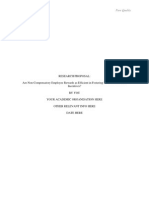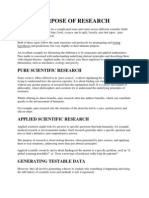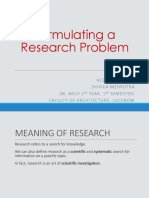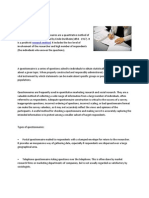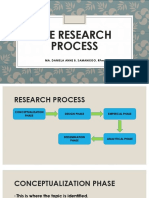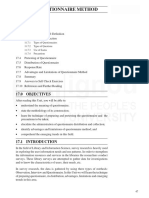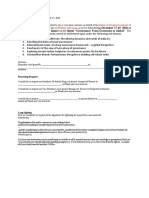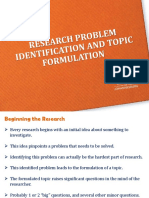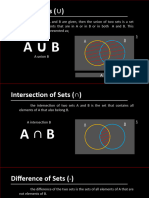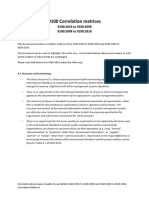What Is Research Ethics
What Is Research Ethics
Uploaded by
LYNDON MENDIOLACopyright:
Available Formats
What Is Research Ethics
What Is Research Ethics
Uploaded by
LYNDON MENDIOLAOriginal Title
Copyright
Available Formats
Share this document
Did you find this document useful?
Is this content inappropriate?
Copyright:
Available Formats
What Is Research Ethics
What Is Research Ethics
Uploaded by
LYNDON MENDIOLACopyright:
Available Formats
What is Research Ethics?
Research that involves human subjects or participants raises unique and complex ethical, legal,
social and political issues. Research ethics is specifically interested in the analysis of ethical
issues that are raised when people are involved as participants in research. There are three
objectives in research ethics. Thefirst and broadest objective is to protect human participants.
The second objective is to ensure that research is conducted in a way that serves interests of
individuals, groups and/or society as a whole. Finally, the third objective is to examine specific
research activities and projects for their ethical soundness, looking at issues such as the
management of risk, protection of confidentiality and the process of informed consent.
For the most part, research ethics has traditionally focused on issues in biomedical research. The
application of research ethics to examine and evaluate biomedical research has been well
developed over the last century and has influenced much of the existing statutes and guidelines
for the ethical conduct of research. However in humanities and social science research, different
kinds of ethical issues arise. New and emerging methods of conducting research, such as auto-
ethnography and participatory action research raise important but markedly different ethical
issues and obligations for researchers.
Research involving vulnerable persons, which may include children, persons with developmental
or cognitive disabilities, persons who are institutionalized, the homeless or those without legal
status, also raises unique issues in any research context.
Research ethicists everywhere today are challenged by issues that reflect global concerns in other
domains, such as the conduct of research in developing countries, the limits of research involving
genetic material and the protection of privacy in light of advances in technology and Internet
capabilities.
Components of Research Ethics
Principle One: Minimizing the risk of harm
Dissertation research should not harm participants. Where there is the possibility that participants
could be harmed or put in a position of discomfort, there must be strong justifications for this.
Such scenarios will also require (a) additional planning to illustrate how participant harm (or
discomfort) will be reduced, (b) informed consent, and (c) detailed debriefing.
There are a number of types of harm that participants can be subjected to. These include:
Physical harm to participants.
Psychological distress and discomfort.
Social disadvantage.
Harm to participants? financial status.
An invasion of participants? privacy and anonymity.
Typically, it is not harm that we need to think about since a researcher does not intentionally go
out to cause harm. Rather, it is the risk of harm that you should try to minimise. In order to
minimising the risk of harm you should think about:
Obtaining informed consent from participants.
Protecting the anonymity and confidentiality of participants.
Avoiding deceptive practices when designing your research.
Providing participants with the right to withdraw from your research at any time.
We discuss each of these ethical principles in the sections that follow, explaining (a) what they
mean and (b) instances where they should (and should not) be followed.
Principle Two: Obtaining informed consent
One of the foundations of research ethics is the idea of informed consent. Simply put, informed
consent means that participants should understand that (a) they are taking part in research
and (b) what the research requires of them. Such information may include the purpose of the
research, the methods being used, the possible outcomes of the research, as well as associated
demands, discomforts, inconveniences and risks that the participants may face. Whilst is it not
possible to know exactly what information a potential participant would (or would not) want to
know, you should aim not to leave out any material information; that is, information that you feel
would influence whether consent would (or would not) be granted.
Another component of informed consent is the principle that participants should be volunteers,
taking part without having been coerced and deceived. Where informed consent cannot be
obtained from participants, you must explain why this is the case. You should also be aware that
there are instances informed consent is not necessarily needed or needs to be relaxed. These
include certain educational, organisational and naturalistic research settings. We discuss these in
more detail under the section: Avoiding deceptive practices.
Principle Three: Protecting anonymity and confidentiality
Protecting the anonymity and confidentiality of research participants is another practical
component of research ethics. After all, participants will typically only be willing
to volunteer information, especially information of a private or sensitive nature, if the researcher
agrees to hold such information in confidence. Whilst it is possible that research participants may
be hurt in some way if the data collection methods used are somehow insensitive, there is
perhaps a greater danger that harm can be caused once data has been collected. This occurs when
data is not treated confidentially, whether in terms of the storage of data, its analysis, or during
the publication process (i.e., when submitting your dissertation to be marked). However, this
does not mean that all data collected from research participants needs to be kept confidential or
anonymous. It may be possible to disclose the identity and views of individuals at various stages
of the research process (from data collection through to publication of your dissertation).
Nonetheless, permissions should be sought before such confidential information is disclosed.
An alternative is to remove identifiers (e.g., vernacular terms, names, geographical cues, etc.) or
provide proxies when writing up. However, such a stripping of identifiable information may not
always be possible to anticipate at the outset of your dissertation when thinking about issues of
research ethics. This is not only a consideration for dissertations following a qualitative research
design, but also a quantitative research design [for more information, see the article: Research
strategy and research ethics].
Principle Four: Avoiding deceptive pratices
At first sight, deceptive practices fly in the face of informed consent. After all, how can
participants know (a) that they are taking part in research and (b) what the research requires of
them if they are being deceived? This is part of what makes the use of deceptive practices
controversial. For this reason, in most circumstances, dissertation research should avoid any
kinds of deceptive practices. However, this is not always the case.
Deception is sometimes a necessary component of covert research, which can be justified in
some cases. Covert researchreflects research where (a) the identity of the
observer and/or (b) the purpose of the research is not known to participants. Cases where you
may choose to engage in covert research may include instances where:
It is not feasible to let everyone in a particular research setting know what you are doing.
Overt observation or knowledge of the purpose of the research may alter the particular
phenomenon that is being studied.
Let's take each of these in turn:
It is not feasible to let everyone in a particular research setting know what you are doing
By feasibility, we are not talking about the cost of doing research. Instead, we mean that it is
not practically possible to let everyone in a particular research setting know what you are doing.
This is most likely to be the case where research involves observation, rather than direct
contact with participants, especially in a public or online setting. There are a number of obvious
instances where this may be the case:
Observing what users are doing in an Internet chat room.
Observing individuals going about their business (e.g., shopping, going to work, etc.).
Clearly, in these cases, where individuals are coming and going, it may simply be impossible to
let everyone known what you are doing. You may not be intentionally trying to engage
in deceptive practices, but clearly participants are not giving you their informed consent.
Overt observation or knowledge of the purpose of the research may alter the particular
phenomenon that is being studied
Where observations or a participants? knowledge of the true purpose of the research have the
potential to alter the particular phenomenon that you are interested in, this is a major concern in
terms of the quality of your findings.
Therefore, when you think about whether to engage in covert research and possibly deceptive
practices, you should think about the extent to which this could be beneficial in your dissertation,
not research in general; that is, everything from the research paradigm that guides your
dissertation through to the data analysis techniques you choose affect issues of research ethics in
your dissertation [see the article: Research strategy and research ethics].
Principle Five: Providing the Right to Withdraw
With the exception of those instances of covert observation where is not feasible to let everyone
that is being observed know what you are doing, research participants should always have
the right to withdraw from the research process. Furthermore, participants should have the right
to withdraw at any stage in the research process. When a participant chooses to withdraw from
the research process, they should not be pressured or coerced in any way to try and stop them
from withdrawing.
If your supervisor and/or Ethics Committee expect you to complete an Ethics Consent Form, it is
likely that you will have to let participants know that they have the right to withdraw at any time
[see the article: Ethics consent form].
Scenario about Violated Research Ethics
You fabricate ideas
You plagriazed ideas
You use idea as a weapon for norms
You use your statistics wrong
You might also like
- Sparing PhilosophyDocument1 pageSparing PhilosophyKevin J. Mills100% (2)
- Research HypothesisDocument6 pagesResearch HypothesisRati Gupta100% (1)
- Ethics in Research NotesDocument1 pageEthics in Research NotesAdonis BesaNo ratings yet
- Research Proposal TemplateDocument5 pagesResearch Proposal TemplateSmallz AkindeleNo ratings yet
- Ethical Principles of ResearchDocument15 pagesEthical Principles of ResearchAstigart Bordios ArtiagaNo ratings yet
- Hippe by Paul CoelhoDocument4 pagesHippe by Paul CoelhoLYNDON MENDIOLA100% (1)
- 757-767 Study Guide PDFDocument144 pages757-767 Study Guide PDFalvaro2005100% (1)
- Research Methodology Ethical Issues in Research - An AssignmentDocument11 pagesResearch Methodology Ethical Issues in Research - An AssignmentSylvia MabodoNo ratings yet
- Dr. Khalid AhmadDocument21 pagesDr. Khalid AhmadHabib ahmad100% (1)
- Research - ProposalDocument31 pagesResearch - ProposalGarvit DhingraNo ratings yet
- Methods of Data CollectionDocument8 pagesMethods of Data CollectionAmbrose Williams100% (1)
- Research MisconductDocument3 pagesResearch MisconductĐi-enNờ-piNo ratings yet
- What Are The Research ObjectivesDocument3 pagesWhat Are The Research ObjectivesSuper MoeNo ratings yet
- Chapter 3 (Amedzror)Document4 pagesChapter 3 (Amedzror)Quame Enam KunuNo ratings yet
- List of Books On Research MethodologyDocument6 pagesList of Books On Research MethodologyBharti Purswani100% (1)
- Unit - IIDocument13 pagesUnit - IInitinnang100% (1)
- Degree Research Proposal SampleDocument12 pagesDegree Research Proposal Sampleperfectlie86% (14)
- Case Study Research.: Design and MethodsDocument9 pagesCase Study Research.: Design and MethodsAkshu GillNo ratings yet
- Chapter 4 Research EthicsDocument17 pagesChapter 4 Research Ethicssamuel debebeNo ratings yet
- 4TH PT1 MethodologyDocument7 pages4TH PT1 MethodologyKirito - kunNo ratings yet
- Introduction To ResearchDocument45 pagesIntroduction To ResearchIoana Bultoc100% (3)
- Ethical ConsiderationDocument2 pagesEthical ConsiderationChelle DedzNo ratings yet
- Research Methods - STA630 Spring 2010 Mid Term Paper Session 2 PDFDocument52 pagesResearch Methods - STA630 Spring 2010 Mid Term Paper Session 2 PDFEhlia Muhammad Umer100% (1)
- Primary Data Collection MethodsDocument2 pagesPrimary Data Collection MethodsPoonal AsasNo ratings yet
- Purpose of ResearchDocument3 pagesPurpose of ResearchPRINTDESK by DanNo ratings yet
- Synopsis WritingDocument7 pagesSynopsis WritingENG18CT0025 Rajesh SNo ratings yet
- How To Do A Literature ReviewDocument2 pagesHow To Do A Literature Reviewdanamaria13100% (10)
- Attachment M - Consent Form To Participate in Patient InterviewDocument4 pagesAttachment M - Consent Form To Participate in Patient InterviewGaela Leniel NocidalNo ratings yet
- Descriptive ResearchDocument17 pagesDescriptive ResearchVipin Kumar C50% (2)
- Research MethodsDocument6 pagesResearch MethodstanvirNo ratings yet
- Final Assessment For Introduction To Research Methods (RMCR3101)Document4 pagesFinal Assessment For Introduction To Research Methods (RMCR3101)Maddah HussainNo ratings yet
- Data Collection Is An Important Aspect of Any Type of Research StudyDocument20 pagesData Collection Is An Important Aspect of Any Type of Research Studykartikeya10No ratings yet
- Formulating A Research ProblemDocument12 pagesFormulating A Research ProblemAesha Upadhyay100% (2)
- Principles of Questionnaire ConstructionDocument39 pagesPrinciples of Questionnaire Constructionnam joon67% (3)
- Non Probability SamplingDocument1 pageNon Probability SamplingAndrea Dela CruzNo ratings yet
- 5.research DesignDocument16 pages5.research DesignManjunatha HRNo ratings yet
- Interdisciplinary ResearchDocument17 pagesInterdisciplinary ResearchFazil HassanNo ratings yet
- Data Collection MethodsDocument33 pagesData Collection MethodssamNo ratings yet
- Chapter 1 - Data CollectionDocument7 pagesChapter 1 - Data CollectionRay AdamNo ratings yet
- Publication Misconduct: DR - Preeta Lall Asst. Professor - Economics Rajiv Gandhi Govt. College, Simga Disstt. BalodabazarDocument56 pagesPublication Misconduct: DR - Preeta Lall Asst. Professor - Economics Rajiv Gandhi Govt. College, Simga Disstt. Balodabazarsanjay kumar100% (1)
- Research ProposalDocument34 pagesResearch ProposalGia GuallarNo ratings yet
- Chapter 5Document5 pagesChapter 5Joshua Paul ErsandoNo ratings yet
- Structured QuestionnairesDocument5 pagesStructured QuestionnairesgeethkeetsNo ratings yet
- L3.Research Process TopicDocument18 pagesL3.Research Process TopicIcia RegachoNo ratings yet
- Elements of A Research ProposalDocument17 pagesElements of A Research ProposalDetektiv Aliff33% (3)
- Research MethodDocument67 pagesResearch MethodMuhammad Ahsan100% (1)
- Parts of A Research PaperDocument8 pagesParts of A Research Paperdiane ganzaganNo ratings yet
- Significance of The StudyDocument2 pagesSignificance of The StudyG-Ignacio, Krizelle Fame V.No ratings yet
- How To Write A Research ArticleDocument3 pagesHow To Write A Research Articlejaden rocksNo ratings yet
- Methods of ResearchDocument43 pagesMethods of ResearchjimmyboyjrNo ratings yet
- Research Methods For Business Course OutlineDocument4 pagesResearch Methods For Business Course OutlineTonesha Gooding100% (1)
- Questionnaire MethodDocument19 pagesQuestionnaire MethodJohn SnowNo ratings yet
- Module 3# SamplingDocument24 pagesModule 3# SamplingPratik BhudkeNo ratings yet
- Group 2 - QUANTITATIVE RESEARCHDocument12 pagesGroup 2 - QUANTITATIVE RESEARCHTanaka Majoboro100% (1)
- Informed ConsentDocument30 pagesInformed Consentroman fayesNo ratings yet
- Amber Convention Centre, Indore On The Theme "Governance: From Grassroots To Global". TheDocument10 pagesAmber Convention Centre, Indore On The Theme "Governance: From Grassroots To Global". TheGeetanjali singh rathoreNo ratings yet
- Questionnaire MethodDocument44 pagesQuestionnaire MethodAkansha Nigam100% (1)
- Qualitative Research Methods: Winston Jackson and Norine VerbergDocument54 pagesQualitative Research Methods: Winston Jackson and Norine VerbergDilshad ShahNo ratings yet
- Final Research PaperDocument27 pagesFinal Research PaperSamiur Rahman100% (1)
- Guidelines For Proposal and Dissertation Preparation-IueaDocument14 pagesGuidelines For Proposal and Dissertation Preparation-IueaokureNo ratings yet
- Importance of Review of LiteratureDocument5 pagesImportance of Review of LiteratureSamuel Raj100% (4)
- Research Problem Identification and Topic FormulationDocument32 pagesResearch Problem Identification and Topic FormulationMichael MatshonaNo ratings yet
- Unit-1 - Research Methodology & Fundamentals of MRDocument31 pagesUnit-1 - Research Methodology & Fundamentals of MRPrashant DubeyNo ratings yet
- Case Study Cervical Cancer InterviewDocument4 pagesCase Study Cervical Cancer InterviewLYNDON MENDIOLANo ratings yet
- Special Products and FactoringDocument41 pagesSpecial Products and FactoringLYNDON MENDIOLANo ratings yet
- Lecture 7 - All About Water (S)Document38 pagesLecture 7 - All About Water (S)LYNDON MENDIOLANo ratings yet
- Abm Curriculum Sched Oct2016Document1 pageAbm Curriculum Sched Oct2016LYNDON MENDIOLANo ratings yet
- Narrative Report in RoboticsDocument4 pagesNarrative Report in RoboticsLYNDON MENDIOLANo ratings yet
- Reflection MAPEHDocument4 pagesReflection MAPEHLYNDON MENDIOLA71% (24)
- Bs Mechatronics Engineering CurriculumDocument2 pagesBs Mechatronics Engineering CurriculumLYNDON MENDIOLANo ratings yet
- Baybayin StrokesDocument22 pagesBaybayin StrokesLYNDON MENDIOLANo ratings yet
- Picture Lyndon WordDocument1 pagePicture Lyndon WordLYNDON MENDIOLANo ratings yet
- Programme: V. Roll CallDocument2 pagesProgramme: V. Roll CallLYNDON MENDIOLANo ratings yet
- Investigators: Physical, Inorganic and Material Science (PIMS) Nanoworks LaboratoryDocument44 pagesInvestigators: Physical, Inorganic and Material Science (PIMS) Nanoworks LaboratoryLYNDON MENDIOLANo ratings yet
- Portfolio SaDocument5 pagesPortfolio SaLYNDON MENDIOLANo ratings yet
- Incredibles IIDocument23 pagesIncredibles IILYNDON MENDIOLANo ratings yet
- Investigators: Physical, Inorganic and Material Science (PIMS) Nanoworks LaboratoryDocument44 pagesInvestigators: Physical, Inorganic and Material Science (PIMS) Nanoworks LaboratoryLYNDON MENDIOLANo ratings yet
- Notes From " OceanofPDF - Com All-The-bright-places - PDF"Document3 pagesNotes From " OceanofPDF - Com All-The-bright-places - PDF"LYNDON MENDIOLANo ratings yet
- Rwerwrq 23Document1 pageRwerwrq 23LYNDON MENDIOLANo ratings yet
- UnchainedDocument1 pageUnchainedLYNDON MENDIOLANo ratings yet
- Bataan National High School City of Balanga Bataan 2003 (M) Rankings 10-EdisonDocument6 pagesBataan National High School City of Balanga Bataan 2003 (M) Rankings 10-EdisonLYNDON MENDIOLANo ratings yet
- 2 Day Website FormatDocument18 pages2 Day Website FormatPanacorp ResearchNo ratings yet
- CV. Gentur Maladi - Inspector 10Document6 pagesCV. Gentur Maladi - Inspector 10abdurrahman warsyahNo ratings yet
- Strategic - Management 1Document20 pagesStrategic - Management 1Noob100% (1)
- Job Interview Common QuestionsDocument27 pagesJob Interview Common QuestionsMarion DeriloNo ratings yet
- Cable Preparation Guide For Connecting MOTOTRBO Control Station (Using PMLN5072 Rear Accessory Connector)Document4 pagesCable Preparation Guide For Connecting MOTOTRBO Control Station (Using PMLN5072 Rear Accessory Connector)SmartPTTNo ratings yet
- Laser Security SystemDocument13 pagesLaser Security SystemArpitRanka67% (12)
- Signature Change FormDocument1 pageSignature Change FormDr Monal YuwanatiNo ratings yet
- CSC461-Objected Oriented ProgrammingDocument52 pagesCSC461-Objected Oriented ProgrammingFranklyn Frank100% (1)
- SNUEconM1314 004700Spring2024ShapiroDocument2 pagesSNUEconM1314 004700Spring2024ShapiroSteven AndiantoNo ratings yet
- MeaningsDocument29 pagesMeaningsErica Rose GonzalesNo ratings yet
- Automated Version 1Document8 pagesAutomated Version 1coronaqcNo ratings yet
- Benefits of ITILDocument18 pagesBenefits of ITILMBA103003No ratings yet
- Grammar Books ProjectDocument5 pagesGrammar Books Projectrita yaremenkoNo ratings yet
- 9100 Correlation MatricesDocument7 pages9100 Correlation Matriceselango22No ratings yet
- 3 Legal ProfessionDocument7 pages3 Legal ProfessionHardik SharmaNo ratings yet
- YearlyDocument30 pagesYearlyMAHESH PATILNo ratings yet
- Price Book FittingsDocument8 pagesPrice Book FittingslkovijayNo ratings yet
- Automatic PO Cretion From PR ME59N T CodeDocument3 pagesAutomatic PO Cretion From PR ME59N T CodeJeevan Kumar BommaliNo ratings yet
- Selfstudys Com File (2)Document21 pagesSelfstudys Com File (2)divanshupareek7No ratings yet
- Ge C Arm Spare Part List Fluorostar 2nd Edition Lower SN 10000Document125 pagesGe C Arm Spare Part List Fluorostar 2nd Edition Lower SN 10000Jairo Manzaneda100% (1)
- 2850 361 Marking Scheme v1 0 PDFDocument6 pages2850 361 Marking Scheme v1 0 PDFMatthew SimeonNo ratings yet
- 10705SI001 - Ghangaru Bahuni Khola IPDocument112 pages10705SI001 - Ghangaru Bahuni Khola IPSharad PanditNo ratings yet
- This Study Resource Was: Calcul. Final Q. UGRD-MATH6100 Calculus 1Document9 pagesThis Study Resource Was: Calcul. Final Q. UGRD-MATH6100 Calculus 1Simoun Angelo DimabogteNo ratings yet
- Instruction Manual - Advance Series 480 Vacuum RegulatorDocument24 pagesInstruction Manual - Advance Series 480 Vacuum RegulatorĐình Sơn HoàngNo ratings yet
- Skimming Practice 1Document6 pagesSkimming Practice 1Nur SafyraNo ratings yet
- Topic: Vidya Pratishthan'sDocument11 pagesTopic: Vidya Pratishthan'sJalo SutariNo ratings yet
- Lecture3 Mech SUDocument15 pagesLecture3 Mech SUNazeeh Abdulrhman AlbokaryNo ratings yet
- Weekly Plan SheetDocument25 pagesWeekly Plan SheetAVENGER OFFICERNo ratings yet
















